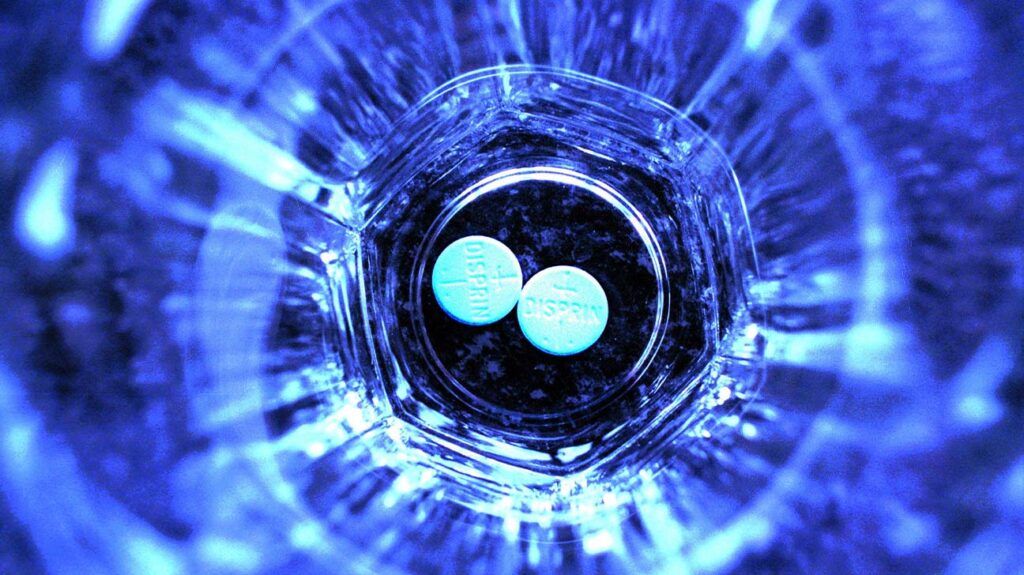
- Heart patients who undergo percutaneous coronary interventions may no longer need to be on two blood thinners for 12 months afterward, according to a new study.
- Blood thinners are prescribed to avoid the formation of clots after such procedures, but carry with them a risk of bleeding events.
- The study found that participants who stopped taking aspirin after one month — while continuing a second blood thinner for 12 months — experienced a 55% reduction in bleeding issues with no additional occurrence of cardiac events.
When someone receives a percutaneous coronary intervention (PCI) to address a heart blockage, doctors prescribe a pair of antiplatelet drugs — or blood thinners — for 12 months post-procedure. A new study suggests that those blood thinners may safely be cut in half after just one month.
The study found that after a month of dual blood thinners, patients can safely stop taking one without experiencing an increased risk of clots forming on the hardware implanted during percutaneous coronary intervention.
The study is published in
While blood thinners offer important protection against the formation of clots, they carry their own risk: bleeding, an inability to form scabs over wounds, as well as other adverse reactions.
The mix of post-procedure antiplatelet medications is referred to as dual antiplatelet therapy or DAPT. It typically contains aspirin as well as a stronger P2Y12 receptor inhibitor, of which there are several. The study involved the use of ticagrelor.
DAPT is prescribed for 12 months because after that period, there is less risk of clotting.
The study looked at medications and outcomes for 3,400 patients with acute coronary syndrome at 58 centers in China, Italy, Pakistan, and the U.K., from August 2018 to October 2022.
All study participants had received PCI. They were randomly assigned to one of two groups after being stable one month after the procedure. For 1,700 patients, the new “DAPT” was simply ticagrelor and a placebo. The remaining individuals remained on ticagrelor and aspirin for the full 12 months.
Of the participants in the ticagrelor-placebo group, just 35 had major or minor bleeding events during the study, compared to 78 of the individuals taking ticagrelor-aspirin after one month. This amounts to a 55% reduction in bleeding events.
Major cardiovascular events were statistically similar between the two groups, meaning that the cessation of aspirin in the ticagrelor-placebo group did not result in an increase in adverse cardiovascular outcomes.
Cheng-Han Chen, MD, medical director of the Structural Heart Program at the MemorialCare Heart & Vascular Institute at Saddleback Medical Center in Laguna Hills, CA, who was not involved in the study, told Medical News Today:
“To fix the problem of clogged arteries, there are two things you can do. In the old days, all we had was bypass surgery, when a surgeon actually goes in and re-routes all the blood supplies around the blockages.”
“[F]or the last 30 years we’ve had this thing called percutaneous coronary intervention. It’s a minimally invasive procedure where we thread small plastic tubes called catheters through either the groin or the wrist up to the heart and then use wires, balloons, and
Blood clots forming around these wires, balloons, and stents are the reason patients are prescribed DAPT. Such clots can block the flow of blood, resulting in ischemic events.
Being so much less invasive than bypass surgery, Chen said, “Percutaneous coronary intervention is a very common technique now.”
“There’s percutaneous coronary interventions going on every day at every single hospital,” said Chen.
The study addresses a balancing act with which cardiologists have been grappling for some time. Jayne Morgan, MD, a cardiologist and the Executive Director of Health and Community Education at the Piedmont Healthcare Corporation in Atlanta, GA, who was also not involved in the study, described the dilemma.
“Even though prevention of ischemic events is the primary purpose of DAPT, there has been some debate regarding DAPT following PCI in patients with both acute and chronic coronary syndromes, as the risk benefit balance is weighed,” she told MNT.
“Clearly the risk of further ischemia must be reduced,” she said. “On the other hand, at what price to increased bleeding and its inherent morbidity on the patient as well?”
Morgan cited two studies, the PEGASUS_TIMI 54 and
Morgan called the results compelling and said she was looking forward to seeing more data on the topic.
“It appears that Single Action Platelet Therapy with ticagrelor alone between months 1 and 12 resulted in a similar rate of MACCE [major adverse cardiac and cerebrovascular events] with lower bleeding complications,” she said.
“This study shows something that we were all wondering. It actually shows that this strategy is effective, even though it’s definitely a safer strategy than what we’re all doing now. And number two, it showed that it wasn’t worse. It wasn’t causing more clots to form on the stent, which is what you were giving the two blood thinners for. That’s really important information for us,” said Chen.
Noting that giving two blood thinners after PCI has been the strategy for decades, he said things will not change immediately. However, the important advisory bodies, such as the American Heart Association, American Cardiology College, and the Society for Cardiovascular Angiography & Interventions revise their guidelines every few years.
“I expect that this will be a big step toward these guidelines changing in the future,” said Chen.
